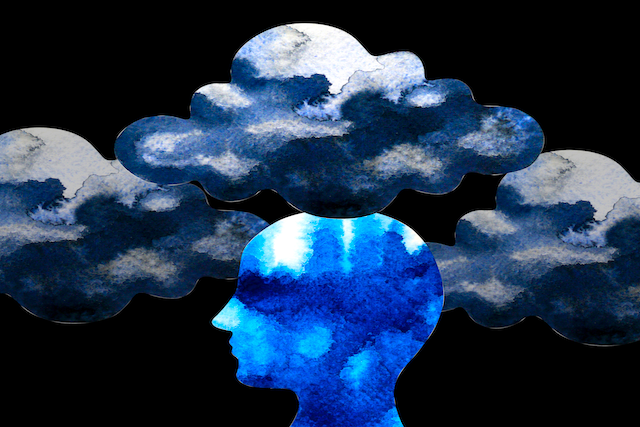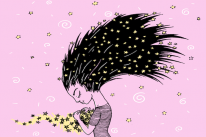
“History, despite its wrenching pain, cannot be unlived, but if faced with courage, need not be lived again.” ~Maya Angelou
I’ve suffered from anxiety and recurrent major depression for more than twenty years. Over that time, I’ve learned a number of lessons about living life and dealing with these diseases.
Two equally meaningful and powerful days from that time stand out to me.
My wedding day, fifteen years ago now, was a happy day when I was more confident and sure about what I was doing than any other.
The day that rivals my wedding day in terms of my surety of purpose came just six months ago, the day I checked myself into the hospital because I feared I was going to kill myself.
Complete opposites on the spectrum of happiness, these two days demonstrate the extreme highs and lows we can feel when we suffer from anxiety and depression.
I remember so many people telling me they’d never seen me happier than when I married Emily. The aching loneliness and raw vulnerability of waiting in an emergency room for ten hours, wearing nothing but a disposable hospital gown on a bed in a hallway under suicide watch, will haunt me forever.
But, of course, life isn’t solely made up of these extremes—most of life is filled with the in-between, the little moments that shape us, the lessons we grow from, the battles we fight every day.
It’s been by being mindful of what I was thinking and feeling on these in-between days that I’ve been able to start recognizing and taking advantage of lessons I’ve learned from my struggles.
Lesson #1: Realize that feelings and disease are separate from our selves.
When we suffer from depression and anxiety, it becomes very easy for us to get wrapped up in our feelings and start thinking about ourselves in terms of our disease.
When you spend so many days feeling depressed, it’s only a small step to start thinking of yourself as depressed. Identifying ourselves with our feelings is a trap these diseases set for us, luring us into becoming self-fulfilling prophecies of doom.
When we start thinking, “I’m so anxious” or “I’m so depressed,” we set ourselves up with the expectation that we’re going to continue to be this way. We then become too anxious to, say, get through a day of work without feeling anxious. We’re anxious about being anxious or depressed about being depressed, and that’s the way we think we’re going to continue to be.
So how do we break these self-fulfilling cycles that are so easy to fall into with depression and anxiety?
The first big lesson I had to learn about dealing with depression and anxiety was this: I am not my depressed or anxious feelings, and I am not my disease. Learning not to identify with these destructive feelings is the first step to freeing yourself from them.
The best way I found to separate myself from my feelings was by practicing mindfulness. I would repeat simple mantras to myself, such as, “I am feeling depressed, but I am not depressed.” Getting these ideas into my consciousness was an important part in making myself healthier.
Lesson #2: Understand that choice is a strong difference maker.
Depression and anxiety can leave us feeling out of control and trapped. We can’t control our thoughts or emotions; they’re just things that happen to us.
I remember feeling so down, I’d lay on my couch with a pillow pulled over my head and ruminate for hours, just stewing about the way I felt or how worthless I thought I was. This could go on for days at a time, interrupted only by anxious sleep. I felt trapped in my own head.
And if it wasn’t the depression, the anxiety would be sure to hammer me into inaction. Constant fear and worry would build on itself until I got anxiety about having more anxiety. I was constantly fearing that I would starting fearing something new, something that might push me over the edge.
I was good at pinning myself in corners. With time and effort, I practiced lesson number one about separating myself from my feelings. And the times I was successful with that, I would move onto lesson number two.
I realized that I couldn’t control my thoughts or feelings, but I also understood that I could choose how I was going to react to them.
Seeing that I had a choice, even when I was feeling trapped, opened me up to new possibilities about the way I could potentially feel. I could choose to get off the couch and take a shower despite my depressed feelings. I could choose to go to work, even if I was scared of doing so.
Knowing I had a choice left the possibility of improvement open in my mind.
Lesson #3: Recognize that courage can be a powerful tool.
Now that I had given myself the strength of choice, I found myself looking at the world a little bit differently. Having choices available to us also means that we’re going to have to make decisions.
Being someone who suffers from anxiety, I found that at first this meant I was going to have more to worry about. What would be the consequences if I did this, or this, or that? It was easy to become paralyzed by my own fears.
So I ruminated more. I dwelled on things longer. I was indecisive.
I spent more time on the couch with my pillow over my head. At least now I was debating with myself instead of drilling deeper into feelings I couldn’t control. I needed something else to get me out.
I needed courage.
Such a powerful tool, courage. It allowed me to start taking steps toward believing in myself, toward doing things that were healthy for me.
It started out with making choices to take showers every day, to eat on a regular basis, to take my medication on time, to keep getting it refilled and to stay on it.
These small healthy choices have allowed me to grow and make bigger healthy choices. I quit a job that wasn’t good for me, I reprioritized my life, I checked myself into the hospital.
I’m getting better, but there are times when I slip or my diseases get stronger. And when that happens, I go back to these three basics: not identifying with my emotions, recognizing my choices in any situation, and acting courageously. They’re steps that always get me pointed in the right direction.
It’s up to me where I go from there.
*This post represents one person’s personal experience. If you’re struggling with depression and nothing seems to help, you may want to contact a professional.
About Jason Large
Jason Large has been experiencing depression and anxiety for twenty-six years. He has recently made a link between his own troubles and his family's history. He writes with the hope of helping others in similar circumstances. If you’d like, you can reach Jason on jasonlarge73@gmail.com.













 Though I run this site, it is not mine. It's ours. It's not about me. It's about us. Your stories and your wisdom are just as meaningful as mine.
Though I run this site, it is not mine. It's ours. It's not about me. It's about us. Your stories and your wisdom are just as meaningful as mine.
Thanks for sharing these powerful insights, Jason.
Courage is so often overlooked as a springboard to life. We often want guarantees, that life will treat us well, that others will treat us well, that we will rise to our own expectations. But life has few guarantees. Courage allows us to act despite uncertainty, to take the next helpful step in our journey.
As Chesterton wrote, “A soldier surrounded by enemies, if he is to cut his way out, needs to combine a strong desire for living with a strange carelessness about dying.”
Instead of being paralysed by uncertainty, everyone can take the small next step in creating a good-enough life. It can be as simple as showering regularly. Then we can keep building on the small victories.
I would add a lesson: Celebrate each small victory. Your courage in the face of adversity, and the actions you take, are a cause for celebration.
Congratulations, and bon voyage for your continuing journey of courage.
Joel, you’re absolutely right about celebrating the small victories. I must admit, that’s one I struggle with doing, but when it’s done regularly it’s a powerful tool for us.
Here is something worth attention , an opportunity for work for those who want to use their free time to make money using their computers… I have been doing this since last two years and I am making 40 to 70 dollars per hour … In the last week I have made 12,245 for almost 18 hours sitting ….
?There are no special skills required just basic typing and an internet connection ….
?There are no time constraints … You may do this any time when you are free ….
?Here is what I’ve been doing….
< ->>www.changeyourdestinyforbetter.blogspot.com >
LE
A great post Thankyou 🙂
I needed this today. Thank you. I’ve saved this article so I can read it again when needed.
Thank you for sharing a posting these. I think the one I’m still having the most trouble with right now is the being courageous part. I’ve had a medical issue that started a year ago and has finally gotten to where I’m almost 100%. I still find that little ego voice in me asking “Are you SURE you can do that?” I’m getting there and will get past it.
Powerful post. I like the part about recognizing that there are choices. Doing them is the very hard part. I appreciate the vulnerability in this piece.
Fantastic tips. Thank you for sharing! 🙂 <3
Thanks so much for sharing your story and wisdom Jason! I have a good friend who suffers from anxiety/depression and I try to help her the best I can but I’ll never truly know what it’s like for her. Thank you for shedding light on a few things she can do to change her situation and giving me more insight into her struggle.
One of the greatest insights is to know fully and at every level that YOU ARE NOT YOUR THOUGHTS.
This is actually one of the primary aspects of the teachings on anatta as taught by the Buddha.
We learn to see our thoughts, memories and emotions not as self, but as visitors. Our job is to become the perfect host to these visitors. If you push them away through aversion, they will simply get stronger. It is consciousness, awakening that heals dukkha – that means awakening to those visitors and treating them with metta. This is REAL mindfulness practice, awakening to dukkha and the resolution of dukkha.
Peter Strong, PhD
Boulder Center for Online Mindfulness Therapy for Anxiety and Depression.
Author of ‘The Path of Mindfulness Meditation’ (Amazon, Kindle). Inquiries welcome!
Jason thank you so much for writing the article. You are very brave and authentic. I am going through this right now. This just popped up on my newsfeed. You were meant to be!! Wishing you all the best from the West Coast……..Vancouver Island.